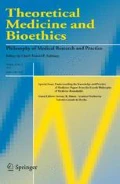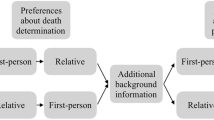Abstract
I, along with others, have been critical of the social construction of brain death and the various social factors that led to redefining death from cardiopulmonary failure to irreversible loss of brain functioning, or brain death. Yet this does not mean that brain death is not the best threshold to permit organ harvesting—or, as people today prefer to call it, organ procurement. Here I defend whole-brain death as a morally legitimate line that, once crossed, is grounds for families to give permission for organ donation. I do so in five moves. First, I make the case that whole-brain death is a social construction that transformed one thing, coma dépassé, into another thing, brain death, as a result of social pressures. Second, I explore the way that the 1981 President’s Commission tried to establish the epistemological certainty of brain death, hoping to avoid making arcane metaphysical claims and yet still utilizing metaphysical claims about human beings. Third, I explore the moral meaning of the social construction of a definition that cannot offer metaphysical certainty about the point at which somebody becomes just some body. Fourth, I describe how two moral communities—Jewish and Catholic—actually ground their metaphysical positions with regard to brain death in the normativity of prior social relations. Finally, I conclude with a reflection on the aesthetic-moral enterprise of the metaphysical-epistemological apparatus of brain death, concluding that only such an aesthetic-moral approach is sufficiently strong to stave off the utility-maximizing tendencies of late-modern Western cultures.
Similar content being viewed by others
Notes
Both Moschella and Sulmasy appear to have a theory of mind that operates behind their claims [19, 20]. For them, there seems to be a Thomistic theory of mind, being, and God that secures the being of being and the being of our knowing of being in an agent intellect in much the same way as Anthony Kenny describes in his book Aquinas on Mind [23]—even while neither Moschella nor Sulmasy appeals to that theory overtly. But that is another story.
References
Time. 1967. Surgery: The ultimate operation. Time, December 15. http://ti.me/PrFbWj.
McRae, Donald. 2006. Every second counts: The race to transplant the first human heart. New York: Berkley Books.
Miller, Franklin G., and Robert D. Truog. 2011. Death, dying, and organ transplantation: Reconstructing medical ethics at the end of life. Oxford: Oxford University Press.
Bishop, Jeffrey P. 2011. The anticipatory corpse: Medicine, power, and the care of the dying. Notre Dame: University of Notre Dame Press.
Engelhardt, H. Tristram, Jr. 1988. Reexamining the definition of death and becoming clearer about what it is to be alive. In Death: Beyond whole-brain criteria, ed. Richard M. Zaner, 91–98. Dordrecht: Springer.
Mollaret, P., and M. Goulon. 1959. Le coma dépassé. Revue Neurologique 101: 3–15.
Giacomini, Mita. 1997. A change of heart and a change of mind? Technology and the redefinition of death in 1968. Social Science and Medicine 44: 1465–1482.
Wolstenholme, G.E.W., and Maeve O’Connor (eds.). 1966. Ethics in medical progress: With special reference to transplantation (Ciba Foundation Symposium). Boston: Little Brown.
Cooper, David K.C. 2010. Open heart: The radical surgeons who revolutionized medicine. New York: Kaplan.
Shapiro, Hillel A. (ed.). 1969. In Experience with human heart transplantation: Proceedings of the Cape Town Symposium, 13‒16 July 1968. Durban: Butterworths.
Ad Hoc Committee of the Harvard Medical School. 1968. A definition of irreversible coma: Report of the ad hoc committee of the Harvard Medical School to examine the definition of brain death. Journal of the American Medical Association 205: 337–340.
Pius XII. 1977. The prolongation of life: An address of Pope Pius XII to an international congress of anesthesiologists. In Death, dying, and euthanasia, ed. Dennis J. Horan and David Mall, 281–287. Washington, DC: University Publications of America.
Schwab, R.S., F. Potts, and A. Bonazzi. 1963. EEG as an aid in determining death in the presence of cardiac activity (ethical, legal, and medical aspects). Electroencephalography and Clinical Neurophysiology 15: 147–148.
Hamlin, Hannibal. 1964. Life or death by EEG. Journal of the American Medical Association 190: 112–114.
Rosoff, S.D., and R.S. Schwab. 1968. The EEG in establishing brain death: A 10-year report with criteria and legal safeguards in the 50 states. Electroencephalography and Clinical Neurophysiology 24: 283–284.
Khushf, George. 2010. A matter of respect: A defense of the Dead Donor Rule and of a “whole-brain” criterion for determination of death. Journal of Medicine and Philosophy 35: 330–364.
President’s Commission for the Study of Ethical Problems in Medicine and Biomedical and Behavioral Research. 1981. Defining death: Medical, legal, and ethical issues in the determination of death. Washington, DC: United States Government Printing Office.
Capron, Alexander Morgan, and Leon R. Kass. 1972. A statutory definition of the standards for determining human death: An appraisal and a proposal. University of Pennsylvania Law Review 121: 87–118.
Moschella, Melissa. 2019. The human organism is not a conductorless orchestra: A defense of brain death as true biological death. Theoretical Medicine and Bioethics. https://doi.org/10.1007/s11017-019-09501-z.
Sulmasy, Daniel P. 2019. Whole-brain death and integration: Realigning the ontological concept with clinical diagnostic tests. Theoretical Medicine and Bioethics. https://doi.org/10.1007/s11017-019-09504-w.
Oderberg, David S. 2019. Death, unity, and the brain. Theoretical Medicine and Bioethics. https://doi.org/10.1007/s11017-019-09479-8.
Veatch, Robert M. 2019. New controversies in defining death: A case for choice. Theoretical Medicine and Bioethics. https://doi.org/10.1007/s11017-019-09505-9.
Kenny, Anthony. 1994. Aquinas on mind. London: Routledge.
Levinas, Emmanuel. 1969. Totality and infinity: An essay in exteriority. Trans. Alphonso Lingis. Pittsburgh: Duquesne University Press.
Swinton, John. 2012. Dementia: Living in the memories of God. Grand Rapids, MI: Eerdmans.
Buber, Martin. 1937. I and thou. Trans. Ronald Gregor Smith. Edinburgh: T&T Clark.
Gross, Sky Edith, Shai Lavi, and Hagai Boas. 2018. Medicine, technology, and religion reconsidered: The case of brain death definition in Israel. Science, Technology and Human Values 44: 186–208.
John Paul II. 2000. Address of the Holy Father John Paul II to the 18th International Congress of the Transplantation Society. http://w2.vatican.va/content/john-paul-ii/en/speeches/2000/jul-sep/documents/hf_jp-ii_spe_20000829_transplants.html.
Keller, Jean. 1997. Autonomy, relationality, and feminist ethics. Hypatia 12: 152–164.
Miller, Sarah Clark. 2017. Reconsidering dignity relationally. Ethics and Social Welfare 11: 108–121.
Zylberman, Ariel. 2018. The relational structure of human dignity. Australasian Journal of Philosophy 96: 738–752.
Wojtyła, Karol. 1979. The person: Subject and community. Review of Metaphysics 33: 273–308.
Author information
Authors and Affiliations
Corresponding author
Additional information
Publisher's Note
Springer Nature remains neutral with regard to jurisdictional claims in published maps and institutional affiliations.
Rights and permissions
About this article
Cite this article
Bishop, J.P. When is somebody just some body? Ethics as first philosophy and the brain death debate. Theor Med Bioeth 40, 419–436 (2019). https://doi.org/10.1007/s11017-019-09508-6
Published:
Issue Date:
DOI: https://doi.org/10.1007/s11017-019-09508-6



